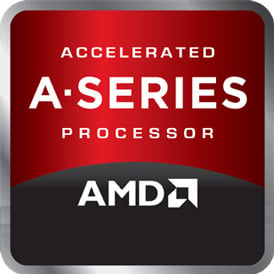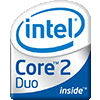
AMD A6-5400K Benchmark, Test and specs
Last updated:
The AMD A6-5400K has 2 cores with 2 threads and is based on the 4. gen of the AMD A series. The processor uses a mainboard with the FM2 socket and was released in Q3/2012. The AMD A6-5400K scores 415 points in the Geekbench 5 single-core benchmark. In the Geekbench 5 multi-core benchmark, the result is 629 points.

| Name: | AMD A6-5400K |
|---|---|
| Family: | AMD A (112) |
| CPU group: | AMD A6-5000 (3) |
| Architecture: | Kabini (Jaguar) |
| Segment: | Mobile |
| Generation: | 4 |
| Predecessor: | -- |
| Successor: | -- |
CPU Cores and Base Frequency
The AMD A6-5400K has 2 CPU cores and can calculate 2 threads in parallel. The clock frequency of the AMD A6-5400K is 3.60 GHz (3.80 GHz). The number of CPU cores greatly affects the speed of the processor and is an important performance indicator.
| CPU Cores / Threads: | 2 / 2 |
|---|---|
| Core architecture: | normal |
| Cores: | 2x |
| Hyperthreading / SMT: | No |
|---|---|
| Overclocking: | Yes |
| Frequency: | 3.60 GHz |
| Turbo Frequency (1 Core): | 3.80 GHz |
| Turbo Frequency (2 Cores): | 3.80 GHz |
Internal Graphics
The AMD A6-5400K has integrated graphics, called iGPU for short. Specifically, the AMD A6-5400K uses the AMD Radeon HD 7540D, which has 192 texture shaders and 3 execution units. The iGPU uses the system's main memory as graphics memory and sits on the processor's die.
| GPU name: | AMD Radeon HD 7540D |
|---|---|
| GPU frequency: | 0.64 GHz |
| GPU (Turbo): | No turbo |
| Compute units: | 3 |
| Shader: | 192 |
| Hardware Raytracing: | No |
| Release date: | Q2/2012 |
| Max. displays: | 2 |
|---|---|
| Generation: | 4 |
| Direct X: | 11 |
| Technology: | 32 nm |
| Max. GPU Memory: | 2 GB |
| Frame Generation: | No |
Hardware codec support
A photo or video codec that is accelerated in hardware can greatly accelerate the working speed of a processor and extend the battery life of notebooks or smartphones when playing videos.
| h265 / HEVC (8 bit): | No |
|---|---|
| h265 / HEVC (10 bit): | No |
| h264: | Decode |
| VP8: | No |
| VP9: | No |
| AV1: | No |
|---|---|
| AVC: | Decode |
| VC-1: | Decode |
| JPEG: | Decode / Encode |
Memory & PCIeThe processor can use up to memory in 2 (Dual Channel) memory channels. The maximum memory bandwidth is 29.9 GB/s. The memory type as well as the amount of memory can greatly affect the speed of the system. |
|
| Memory type: | Memory bandwidth: |
|---|---|
| DDR3-1866 | 29.9 GB/s |
| Max. Memory: | |
| Memory channels: | 2 (Dual Channel) |
| ECC: | No |
| PCIe: | |
| PCIe Bandwidth: | -- |
Thermal ManagementThe thermal design power (TDP for short) of the processor is 65 W. The TDP specifies the necessary cooling solution that is required to cool the processor sufficiently. The TDP usually gives a rough idea of the actual power consumption of the CPU. |
|
|---|---|
| TDP (PL1 / PBP): | 65 W |
| TDP (PL2): | -- |
| TDP up: | -- |
| TDP down: | -- |
| Tjunction max.: | -- |
Technical details
The AMD A6-5400K is made in 28 nm. The smaller the manufacturing process of a CPU, the more modern and energy-efficient it is. Overall, the processor has 1.00 MB cache. A large cache can greatly speed up the processor's speed in some cases such as games.
| Technology: | 28 nm |
|---|---|
| Chip design: | |
| Socket: | FM2 |
| L2-Cache: | -- |
| L3-Cache: | 1.00 MB |
| AES-NI: | Yes |
| Operating systems: |
| Virtualization: | AMD-V |
|---|---|
| Instruction set (ISA): | x86-64 (64 bit) |
| ISA extensions: | SSE4a, SSE4.1, SSE4.2, AVX |
| Release date: | Q3/2012 |
| Release price: | 45 $ |
| Part Number: | -- |
| Documents: | -- |
Rate this processor
Benchmark results

The benchmark results for the AMD A6-5400K have been carefully checked by us. We only publish benchmark results that have been created by us or that have been submitted by a visitor and then checked by a team member. All results are based on and fullfill our benchmark guidelines.
Geekbench 5, 64bit (Single-Core)
Geekbench 5 is a cross plattform benchmark that heavily uses the systems memory. A fast memory will push the result a lot. The single-core test only uses one CPU core, the amount of cores or hyperthreading ability doesn't count.

|
AMD Athlon II X2 255
2C 2T @ 3.10 GHz |
||

|
Intel Core i3-4005U
2C 4T @ 1.70 GHz |
||

|
Intel Core i3-4010U
2C 4T @ 1.70 GHz |
||
|
|
AMD A6-5400K
2C 2T @ 3.80 GHz |
||

|
Intel Core2 Duo E8200
2C 2T @ 2.66 GHz |
||

|
Intel Core2 Duo E8190
2C 2T @ 2.66 GHz |
||

|
Intel Pentium E5700
2C 2T @ 3.00 GHz |
||
Geekbench 5, 64bit (Multi-Core)
Geekbench 5 is a cross plattform benchmark that heavily uses the systems memory. A fast memory will push the result a lot. The multi-core test involves all CPU cores and taks a big advantage of hyperthreading.

|
Intel Celeron 2955U
2C 2T @ 1.40 GHz |
||

|
Intel Atom Z3745D
4C 4T @ 1.33 GHz |
||

|
Intel Core2 Duo E4700
2C 2T @ 2.60 GHz |
||
|
|
AMD A6-5400K
2C 2T @ 3.80 GHz |
||

|
AMD A4-6210
4C 4T @ 1.80 GHz |
||

|
Intel Pentium E5200
2C 2T @ 2.50 GHz |
||

|
Intel Core2 Duo E6550
2C 2T @ 2.33 GHz |
||
Cinebench R20 (Single-Core)
Cinebench R20 is the successor of Cinebench R15 and is also based on the Cinema 4 Suite. Cinema 4 is a worldwide used software to create 3D forms. The single-core test only uses one CPU core, the amount of cores or hyperthreading ability doesn't count.

|
Intel Core 2 Quad Q9300
4C 4T @ 2.50 GHz |
||

|
Intel Xeon X3440
4C 8T @ 2.93 GHz |
||

|
AMD A8-3870K
4C 4T @ 3.10 GHz |
||
|
|
AMD A6-5400K
2C 2T @ 3.80 GHz |
||

|
Intel Pentium Silver N5000
4C 4T @ 2.70 GHz |
||

|
AMD Phenom II X4 940
4C 4T @ 3.00 GHz |
||

|
AMD Phenom II X4 945
4C 4T @ 3.00 GHz |
||
Cinebench R20 (Multi-Core)
Cinebench R20 is the successor of Cinebench R15 and is also based on the Cinema 4 Suite. Cinema 4 is a worldwide used software to create 3D forms. The multi-core test involves all CPU cores and taks a big advantage of hyperthreading.

|
AMD A8-4500M
4C 4T @ 2.80 GHz |
||

|
AMD A9-9425
2C 2T @ 3.10 GHz |
||

|
Intel Core m3-6Y30
2C 4T @ 1.80 GHz |
||
|
|
AMD A6-5400K
2C 2T @ 3.80 GHz |
||

|
Intel Atom x7-E3950
4C 4T @ 1.60 GHz |
||

|
AMD A6-9225
2C 2T @ 2.60 GHz |
||

|
Intel Core m3-7Y30
2C 4T @ 2.00 GHz |
||
iGPU - FP32 Performance (Single-precision GFLOPS)
The theoretical computing performance of the internal graphics unit of the processor with simple accuracy (32 bit) in GFLOPS. GFLOPS indicates how many billion floating point operations the iGPU can perform per second.

|
Intel Core i5-2415M
Intel HD Graphics 3000 @ 1.30 GHz |
||

|
Intel Core i5-2435M
Intel HD Graphics 3000 @ 1.30 GHz |
||

|
Intel Core i5-2520M
Intel HD Graphics 3000 @ 1.30 GHz |
||
|
|
AMD A6-5400K
AMD Radeon HD 7540D @ 0.64 GHz |
||

|
AMD A6-5400B
AMD Radeon HD 7540D @ 0.64 GHz |
||
|
|
HiSilicon Kirin 960S
ARM Mali-G71 MP8 @ 0.90 GHz |
||
|
|
HiSilicon Kirin 960
ARM Mali-G71 MP8 @ 0.90 GHz |
||
Estimated results for PassMark CPU Mark
Some of the CPUs listed below have been benchmarked by CPU-monkey. However the majority of CPUs have not been tested and the results have been estimated by a CPU-monkey’s secret proprietary formula. As such they do not accurately reflect the actual Passmark CPU mark values and are not endorsed by PassMark Software Pty Ltd.

|
AMD Phenom II X2 511
2C 2T @ 3.40 GHz |
||

|
Intel Core i3-5010U
2C 4T @ 2.10 GHz |
||

|
Intel Celeron G3900
2C 2T @ 2.80 GHz |
||
|
|
AMD A6-5400K
2C 2T @ 3.80 GHz |
||

|
Intel Core i5-4250U
2C 4T @ 2.60 GHz |
||

|
Intel Core m3-6Y30
2C 4T @ 1.80 GHz |
||

|
Intel Pentium G3440
2C 2T @ 3.30 GHz |
||
CPU-Z Benchmark 17 (Multi-Core)
The CPU-Z benchmark measures a processor's performance by measuring the time it takes the system to complete all benchmark calculations. The faster the benchmark is completed, the higher the score.

|
Intel Pentium E2200
2C 2T @ 2.20 GHz |
||

|
Intel Pentium N3700
4C 4T @ 1.60 GHz |
||

|
Intel Core2 Duo T6570
2C 2T @ 2.10 GHz |
||
|
|
AMD A6-5400K
2C 2T @ 3.60 GHz |
||

|
Intel Pentium B960
2C 2T @ 2.20 GHz |
||

|
Intel Celeron 1037U
2C 2T @ 1.80 GHz |
||

|
Intel Core2 Duo E6400
2C 2T @ 2.13 GHz |
||
Benchmarks

Geekbench 5 (SC)
2,488 entries
2,488 entries

Geekbench 5 (MC)
2,461 entries
2,461 entries

Cinebench R20 (SC)
656 entries
656 entries

Cinebench R20 (MC)
604 entries
604 entries

FP32 SP (iGPU)
2,026 entries
2,026 entries

PassMark CPU-Mark
2,391 entries
2,391 entries

CPU-Z Benchmark 17 (MC)
733 entries
733 entries

Geekbench 3 (SC)
942 entries
942 entries

Geekbench 3 (MC)
938 entries
938 entries

Cinebench R11.5 (SC)
825 entries
825 entries

Cinebench R11.5 (MC)
836 entries
836 entries
Popular comparisons
back to index






